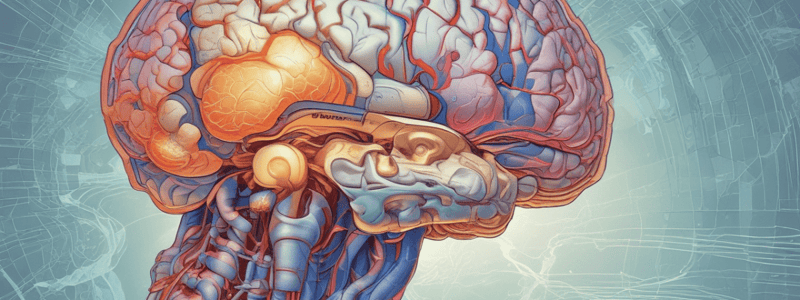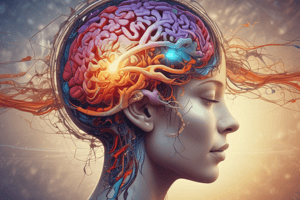Podcast
Questions and Answers
Computed tomography, also known as a ______ scan, was the 1st modern medical imaging technique.
Computed tomography, also known as a ______ scan, was the 1st modern medical imaging technique.
CAT
Magnetic resonance imaging (MRI) measures the radio-frequency waves emitted by the nuclei of ______ atoms.
Magnetic resonance imaging (MRI) measures the radio-frequency waves emitted by the nuclei of ______ atoms.
hydrogen
Functional magnetic resonance imaging (fMRI) measures brain activity by detecting the increase in ______ levels in active neural structures.
Functional magnetic resonance imaging (fMRI) measures brain activity by detecting the increase in ______ levels in active neural structures.
oxygen
Positron emission tomography (PET) involves injecting a ______ substance into the bloodstream.
Positron emission tomography (PET) involves injecting a ______ substance into the bloodstream.
Ethics in ______ developed over the years.
Ethics in ______ developed over the years.
The Golgi stain outlines the whole cell, including ______ spines.
The Golgi stain outlines the whole cell, including ______ spines.
Myelin stains are taken up by the fatty myelin that wraps and insulates ______.
Myelin stains are taken up by the fatty myelin that wraps and insulates ______.
Nissl stain outlines all cell bodies because dye is attracted to ______ in the nucleus.
Nissl stain outlines all cell bodies because dye is attracted to ______ in the nucleus.
Autoradiography reveals which neurons are ______.
Autoradiography reveals which neurons are ______.
Immunocytochemistry uses antibodies attached to a dye to identify cellular components including ______, neurotransmitters, enzymes.
Immunocytochemistry uses antibodies attached to a dye to identify cellular components including ______, neurotransmitters, enzymes.
Electroencephalography (EEG) was invented by German psychiatrist ______.
Electroencephalography (EEG) was invented by German psychiatrist ______.
EEG is recorded from two ______ on the scalp over the area of interest.
EEG is recorded from two ______ on the scalp over the area of interest.
EEG is used to diagnose disorders such as epilepsy or brain ______.
EEG is used to diagnose disorders such as epilepsy or brain ______.
Transcranial Magnetic Stimulation is a relatively new ______ brain stimulation technique.
Transcranial Magnetic Stimulation is a relatively new ______ brain stimulation technique.
In the Czech Republic, Transcranial Magnetic Stimulation is used for resistant ______.
In the Czech Republic, Transcranial Magnetic Stimulation is used for resistant ______.
Flashcards are hidden until you start studying
Study Notes
Brain Imaging Techniques
- Computed Tomography (CT or CAT scan) produces 3D images of organs by combining a series of 2D X-ray cross sections taken from different angles.
- Magnetic Resonance Imaging (MRI) measures radio-frequency waves emitted by hydrogen atoms in a strong magnetic field.
- Functional Magnetic Resonance Imaging (fMRI) detects brain activity by measuring oxygen level increases in active neural structures.
- Positron Emission Tomography (PET) involves injecting radioactive substances into the bloodstream, which are taken up by active brain parts.
Research Ethics
- Ethics in research have developed over the years.
Electroencephalography (EEG)
- EEG was invented by German psychiatrist Hans Berger.
- EEG records electrical activity from two scalp electrodes, detecting combined neuron activity between them.
- EEG is used for research and diagnosing disorders like epilepsy or brain tumors.
Transcranial Magnetic Stimulation
- Transcranial Magnetic Stimulation (TMS) is a non-invasive brain stimulation technique using a magnetic coil to induce voltage in brain tissue.
- It is used to treat resistant depression in the Czech Republic.
Research Techniques
The Golgi Stain
- The Golgi stain outlines whole cells, including dendritic spines, and is used to characterize cell types.
- It only stains a small number of neurons.
Myelin Stains
- Myelin stains are taken up by fatty myelin that wraps and insulates axons, identifying neural pathways.
Nissl Stain
- Nissl stain outlines all cell bodies due to RNA in the nucleus attraction, allowing cell body size and density measurement.
Autoradiography
- Autoradiography makes active neurons visible, allowing correlation with behavior.
Immunocytochemistry
- Immunocytochemistry uses antibody-attached dyes to identify cellular components, including receptors, neurotransmitters, and enzymes.
The Transmission Electron Microscope
- The transmission electron microscope passes an electron beam through a thin tissue slice, producing an image by varying electron blocking degrees.
Studying That Suits You
Use AI to generate personalized quizzes and flashcards to suit your learning preferences.





